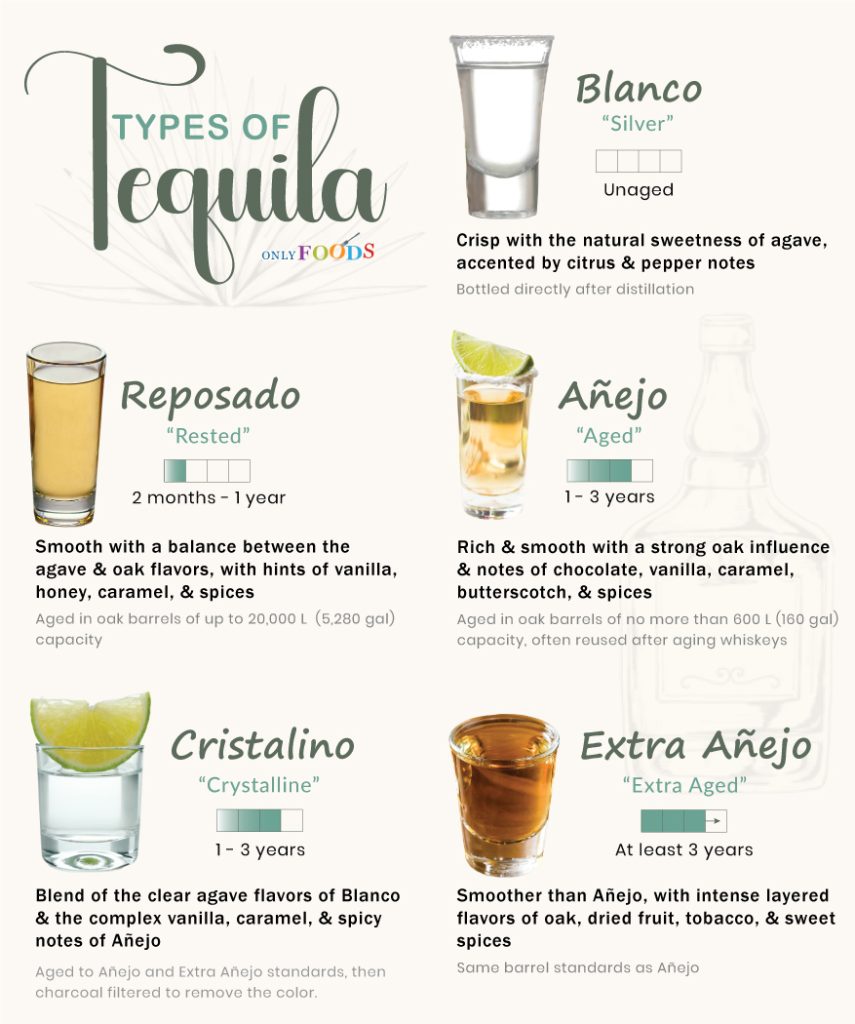Types of Tequila
Tequila is one of the most familiar spirits, alongside beer, whiskey, and wine. There are several types of tequilas based on their distillation and aging process. But they are all made from the blue agave plant and are manufactured in the Mexican state of Jalisco, specifically in the areas surrounding the town of Tequila. In fact, being manufactured in Jalisco is one of the factors a tequila needs to meet legal requirements.
Tequilas are sometimes confused with mezcals, another distilled spirit originating from Mexico. However, mezcals can be made using any of over 30 types of agave plants. So, tequila is actually a type of mezcal made only from blue agave; the two are not considered the same by any standards.
Classification of the Different Types of Tequila
The production involves harvesting and processing the edible parts of the blue agave plant to produce the mash and extract its juice, which is then fermented for a few days in the presence of yeasts. The legal ABV range for tequila is between 35% and 55%, with most bottled products having around 40% ABV.
Based on Ingredient
Widely, tequilas can be classified into two categories: 100% agave tequilas and “mixtos” containing at least 51% agave, with other sugars making up the rest of the 49%. A 100% agave tequila will have it mentioned on the bottle — otherwise, it is likely a mixtos, some kind of mezcal, or even a fake.
Based on Distillation
At the end of the fermentation, the wort undergoes distillation. A tequila must be distilled at least twice, as required by law. The first distillation produces what is known as the “ordinario,” while the result of the second distillation is called the “silver” tequila. Some manufacturers go for a third distillation, which may result in a smoother spirit. Still, it is not a very popular practice as it tends to strip away too much of the characteristic agave flavor from the final product.
Based on Aging
Next comes aging, which is the primary basis for tequila classification. The distilled spirit is aged in oak barrels, typically made of white oak from the US, Canada, or France. The main types of tequila, based on their aging duration, are:
- Blanco (“silver” or “white”)
- Reposado (“rested”)
- Añejo (“aged”)
- Extra Añejo (“extra aged”)
A fifth type, Cristalino or “crystalline,” is a combination of the Blanco and Añejo styles, often with flavoring additives. Here’s more on what each of these types looks and tastes like, with their aging duration and standards:
Note that all the above varieties may be produced either as 100% agave or mixtos. The composition and percentage of agave in a product is usually mentioned on the bottle’s label.
Some sources consider the Joven or gold tequila to be a sixth type, but it is generally made by adding caramel color and grain alcohols, such as whiskey, to white or Blanco tequila. However, certain expensive gold tequilas are made by blending Reposado and Blanco varieties to create the stronger flavor and warm amber color associated with them. Either way, it is not typically regarded as a true classification on the same level as the five main types.
Adding flavors has also become a common practice. Though initially resisted by the Tequila Regulatory Council (TRC), flavored mixto varieties are now permitted to carry the label “tequila.” 100% agave tequilas are still subject to strict regulations and cannot contain any additives or flavorings to meet legal standards.
Does the Type of Tequila Matter When Making Cocktails
Though some salt and lemon are enough to enjoy a tequila shot, it is also the main ingredient in several of the world’s most famous cocktails, with the Margarita topping the list. Other popular tequila-based drinks include the Paloma, Tequila Sunrise, Matador, and Long Island Iced Tea. Additionally, several varieties of Martini incorporate tequila along with other liquors. The International Bartenders Association (IBA) standards recommend using 100% agave tequila for classic cocktails like Margarita.
While Blanco tequila is often the preferred choice for most cocktails, other varieties can also be used based on personal preferences. Each type of tequila brings a unique feature to the mix:
- Being unaged, Blanco offers a pure and vibrant agave flavor that enhances cocktails.
- Aged varieties like Reposado and Añejo elevate the flavor profile with their deeper, richer notes, contributing their own character to the drinks.
- Cristalino adds complexity without altering the cocktail’s color.
FAQ
Since tequila is made primarily from the blue agave plant, it is generally considered gluten-free, even in mixtos, which may contain up to 49% other sugars. Still, it is a good idea to check the label to ensure there are no additives that contain gluten.
Tequila producers never use worms in any of their products. However, some varieties of mezcal do have maguey worms (worms that infest the maguey or agave plant) added to the bottle to enhance the flavor and color of the liquor. Despite being commonly called the ‘tequila worm,’ this worm is never added to tequilas.
Celebrity tequilas are brands launched or heavily endorsed by celebrities, who may also play an active role in the production and business aspects. Many of these tequilas are crafted in partnership with established Mexican distilleries and come in multiple varieties and price ranges. Some of the most popular celebrity tequilas include Casamigos (Co-founded by George Clooney), Teremana (by Dwayne Johnson), and Cincoro (Co-owned by Michael Jordan).

